|
|
|
Sort Order |
|
|
|
Items / Page
|
|
|
|
|
|
|
| Srl | Item |
| 1 |
ID:
172311
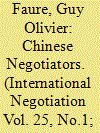

|
|
|
|
|
| Summary/Abstract |
Since China opened to the outside world in 1978, Chinese negotiators have made considerable changes in the ways they consider negotiation, strategies to implement action, and tactics used. The underlying values of their practice have also undergone a notable evolution. However, there are dimensions which remain stable and constitute the core of what could be defined as the deep “Chineseness” of these negotiators. This essay provides insight into Chinese negotiation practice and its evolution.
|
|
|
|
|
|
|
|
|
|
|
|
|
|
|
|
| 2 |
ID:
172305
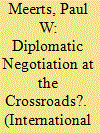

|
|
|
|
|
| Summary/Abstract |
While interstate negotiation is becoming more important than ever in guiding the course of world affairs, it is in danger of being weakened as a consequence of the erosion of multilateral diplomacy. Multilateral organizations and cooperation between states has opened new pathways for negotiation, stabilized the world, and served to equalize power distribution. Growing multilateralism has protected negotiation processes and offered smaller powers more of a say in world affairs. However, with the current trend for powerful countries to undermine multilateral negotiation processes in favor of bilateral and minilateral power-based negotiations, global political gaps are widening. This will undermine small countries and middle powers that want to use diplomatic negotiation as their main tool to influence others. The consequence could be a process of diplomatic negotiation used by hegemonic powers to further their interests to the detriment of the less powerful.
|
|
|
|
|
|
|
|
|
|
|
|
|
|
|
|
| 3 |
ID:
172303


|
|
|
|
|
| Summary/Abstract |
Much can change over 25 years. When International Negotiation was established in 1996, it was just a few years after the breakup of the Soviet Union, the disintegration of the Eastern Bloc, and the founding of the European Union. Within a few years after publication began, international terrorist incidents grew rapidly, populist citizen-led protests resulted in the downfall of many governments, the use of information technology and social media mushroomed yielding countless new channels to communicate and organize, many new multinational regimes were formulated, and the rise of the Global South resulted in an upsurge of cooperation among developing countries, to name a few momentous events and trends. Many more critical changes in the global arena can be listed, all having important impacts on the processes and outcomes of international negotiation and mediation.
|
|
|
|
|
|
|
|
|
|
|
|
|
|
|
|
| 4 |
ID:
172312
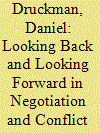

|
|
|
|
|
| Summary/Abstract |
In this article, I look back primarily at the research accomplishments made by my various collaborative teams to date and look forward toward the gaps that remain to be filled. Key insights and gaps are discussed on five research topics: group attachments and representation, turning points, social justice, values and interests, and conceptual learning. A concluding section highlights key discoveries that provide fertile ground for new research. Examples include the pulls and pushes of stakeholders, the role played by crises in producing turning points, connecting micro- to macro-level processes, the link between values and identities, and the thought processes that are encouraged by design activities. Further, advances in methodologies contribute to the next generation of studies on negotiation and conflict.
|
|
|
|
|
|
|
|
|
|
|
|
|
|
|
|
| 5 |
ID:
172310


|
|
|
|
|
| Summary/Abstract |
The focal point of this essay is the duration of intractable conflicts. The mere passage of time has no magical effect on conflicting notions of justice. On the contrary, a succession of crises and tensions accentuates entrenched positions concerning historical grievances. First, we present the processes through which parties defend a particular notion of justice on behalf of previous generations as rational games that depend, to a large extent, on parties’ interests. Second, we examine these processes from a moral perspective. Rather than emphasizing strategic dynamics that are based on political interpretations of the past, we focus on ethical quandaries related to the “paradoxical absence” of those who remain at the center of the justice claims. Third, we go beyond rational and moral dimensions to focus on the emotional weight of traumatic events and their long-lasting impacts on victims’ descendants.
|
|
|
|
|
|
|
|
|
|
|
|
|
|
|
|
| 6 |
ID:
172307


|
|
|
|
|
| Summary/Abstract |
The global arms control regime that began with the Partial Nuclear Test Ban Treaty (1963) appears to be collapsing rapidly, with many agreements now abandoned or barely enforced. This article analyzes some of the challenges to new negotiations on arms control based on developments in negotiation theory over the past 60 years. It focuses on the management of multilateral rather than bilateral negotiations, the need to focus on absolute rather than relative gains, the use of problem-solving techniques rather than traditional bargaining, the management of domestic opposition to arms control, the need for national leaders to become active proponents of new negotiations, and the need to focus on norms of cooperative security rather than engaging in arms races. It concludes that a necessary, if not sufficient, condition to save and rebuild the arms control regime is the adoption of more constructive approaches to negotiation on these vital issues.
|
|
|
|
|
|
|
|
|
|
|
|
|
|
|
|
| 7 |
ID:
172309


|
|
|
|
|
| Summary/Abstract |
This essay raises the question whether citizens in the digital age can learn from how credibility is treated in international negotiations. Negotiators face problems both in attempting to send credible signals and in making credibility assessments of received signals. Several studies, starting with Schelling’s seminal analysis of commitments, indicate that credible signals are those that are somehow costly to the sender. Contributions to our understanding of how recipients make credibility assessments include Jervis’s distinction between signals (with no inherent credibility) and indices (believed to be untainted by deception). The most general conclusion emerging from existing research is that there is no definitive, infallible solution to the problem of credibility, insofar as deception and misperception are intrinsic to all signaling systems. Today’s unfortunate combination of limited awareness of credibility problems, on the one hand, and technological advances facilitating deception, on the other, calls for intensified education as well as multidisciplinary research.
|
|
|
|
|
|
|
|
|
|
|
|
|
|
|
|
| 8 |
ID:
172308
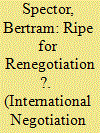

|
|
|
|
|
| Summary/Abstract |
An international negotiated agreement is typically viewed as a major achievement, but it may not last forever. Sometimes agreements need to be adjusted – still based on the existing formulas – as a result of changed circumstances or because particular provisions prove not as effective as originally hoped. But other times, agreements need to be overhauled from scratch and renegotiated using new formulas and possibly involving new actors. Such renegotiations are an under-examined process in the negotiation literature. When and why are renegotiations called for, and what are the best tactics and strategies to ensure that they succeed for the mutual benefit of all stakeholders? This article presents basic research questions that need to be addressed.
|
|
|
|
|
|
|
|
|
|
|
|
|
|
|
|
| 9 |
ID:
172304
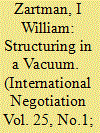

|
|
|
|
|
| Summary/Abstract |
The current context of increasing entropy in international politics poses challenges for negotiation and negotiation analysis. The current System of World Disorder contains defining characteristics that do not fit well with established negotiation concepts and practice. Following a few decades of progress in conflict management after the bipolar system, major regions of the world have seen dedicated attempts to bring conflicts under control in the current decade failing for lack of ripeness, trade-offs, reframing, mediation and support. New concepts and practices of negotiation are required to deal with the current vacua in international politics and their consequences.
|
|
|
|
|
|
|
|
|
|
|
|
|
|
|
|
| 10 |
ID:
172313


|
|
|
|
|
| Summary/Abstract |
“Management of complexity” was identified as a paradigm for negotiation analysis 25 years ago. Substantial progress has been made in conceptualizing complex negotiations since, although less has been accomplished with regard to operationalizing that knowledge so that tools can be developed to manage complex negotiations. This article begins by reviewing five separate theoretical frameworks of negotiation complexity and, through this analysis, identifies six significant characteristics of negotiation complexity: party numbers, negotiator roles, external environment, negotiation process, negotiation strategy, and party relations. Operational tools are identified for each variable. On the basis of this analysis, the article concludes by identifying additional tools that could be developed for managing complex negotiations.
|
|
|
|
|
|
|
|
|
|
|
|
|
|
|
|
| 11 |
ID:
172306
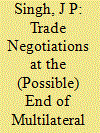

|
|
|
|
|
| Summary/Abstract |
Multilateral negotiations are often facilitated through international organizations, but are not coterminous with them. This essay advances a few ‘mid-level’ propositions with respect to the negotiation structure that provides an overall context and the negotiation process where tactics guide the exchange of concessions. In terms of negotiation structure, a stable institutional structure is giving rise to a transitional one resulting in system spoilers in international negotiations leading to deadlocks and no-agreements. The bargaining phases are marked with games of chicken and grand-standing making it hard to effectively practice common negotiation tactics such as coalition-building, trade-offs and linkages. The article provides examples from the Uruguay Round and the breakdown of the Doha Round of trade negotiations through the World Trade Organization. The essay’s propositions address the breakdown of existing multilateralism through international organizations, but also document the continuation of underlying multilateral principles.
|
|
|
|
|
|
|
|
|
|
|
|
|
|
|
|
|
|
|
|
|